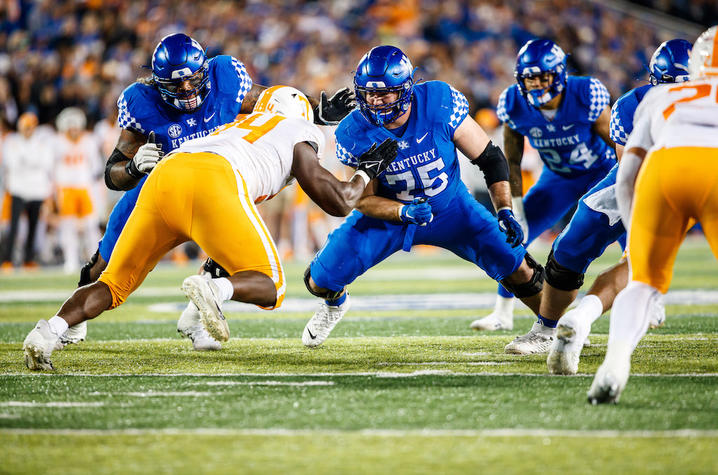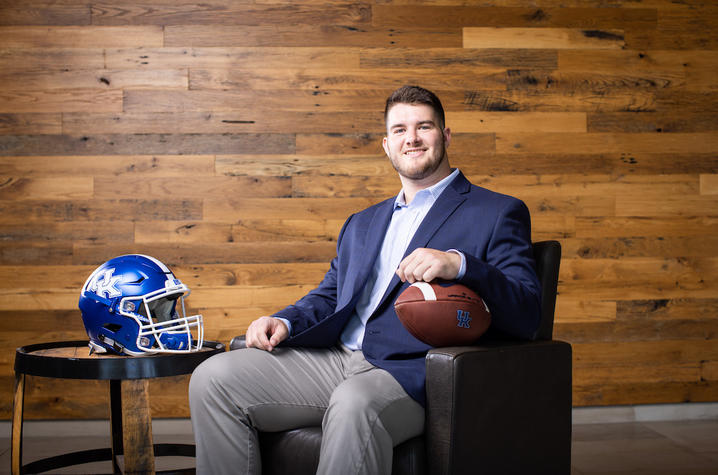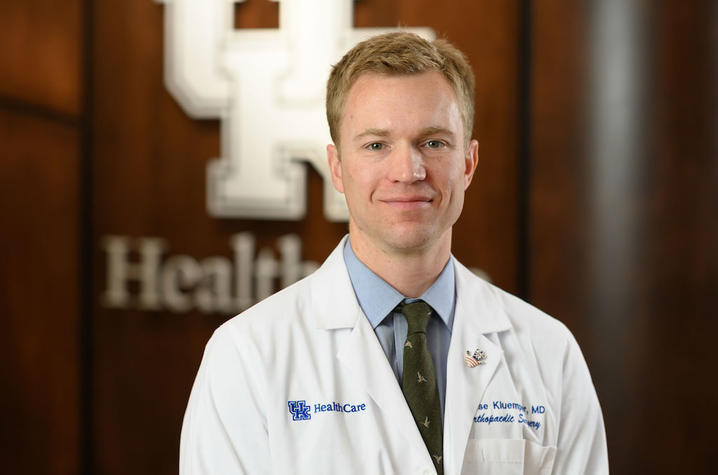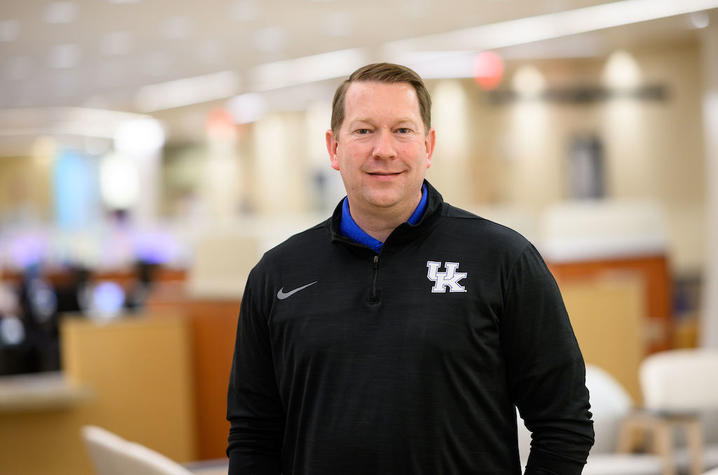Small injury, big implications — UK HealthCare helps Eli Cox return to the gridiron
LEXINGTON, Ky. (Aug. 29, 2022) — During the 2021 Kentucky Wildcats football season, early in the highly anticipated game against Tennessee, the University of Kentucky’s starting offensive lineman Eli Cox endured a seemingly small injury with big implications — as it took him out for the rest of the season.
While pass blocking in the first half, Cox pulled a defender in and as they quickly attempted to move away, his left pinky finger got caught in the opponent’s jersey and Cox felt a “pop.” He quickly saw his athletic trainer on the sideline, where they had thought he likely dislocated the finger, taped it back together, and played the rest of the game.
But they soon realized their issue was much more serious than a dislocation.
After the game, Cox’s doctors gave him an X-ray and determined there were no broken bones, so they scheduled an MRI and office visit with Chase T. Kluemper, M.D., assistant professor of orthopaedic surgery at the UK HealthCare Hand Center.
Kluemper diagnosed Cox with a torn flexor digitorum profundus (FDP) tendon in his left little finger, an injury that prevented him from moving the finger or using it to grasp in any meaningful way. Ultimately, this meant he could not effectively protect the quarterback.
Treatment began with therapy, which could help determine if Cox was able to compensate for the loss of that tendon with the remaining tendons in his hand. Unfortunately, the midseason All-American offensive lineman could not perform at a high level without his characteristic grip strength, and the decision for surgery was made.
With this decision for surgery, Cox discovered that he would be out for the rest of the season.
“When I found out I would be out for the rest of the season, it was frustrating,” Cox said. “This was my first year starting and I really didn’t want the season to be cut short. I was finally in the position I wanted to be in on our team, and we were on a roll — it had been a pretty successful season so far. So, it just sucked to have that cut so short.”
Kluemper said that this diagnosis would be serious for any of us — but in Cox’s case, it very well could have put his football career in jeopardy.
“Finger motion is integral to the function of the hand,” Kluemper said. “When one finger can’t move, the tendons and bones in the rest of your hand are thrown off. It would significantly impair anyone’s ability to work, but in Eli’s case, this is literally essential to his job. Grip strength is part of what makes him an elite offensive lineman, and without it, he can’t effectively block opposing players.”
Within the week, Cox went in for surgery and had 14 weeks of a brace and bandages ahead of him. He was unable to use his pinky finger in anything other than rehab, so this also meant no practice. This was not only physically challenging for Cox, but it was a mental challenge.
“It was hard on me to go from super busy game planning every week to go to nothing,” Cox said. “It was physically challenging and mentally challenging, too. Really, more mentally than physically because this injury was so small — it’s not like I was recovering from an ACL injury. This was just my pinky finger, but the injury was on a part of my body that is critical to my game.”
One provider that was a key to getting Cox back on the field was Matthew Rose, an occupational therapist and rehab clinical coordinator with the UK HealthCare Hand Center.
“Matt was very up front with and honest with me about my treatment, which I appreciated,” Cox said. “He put me on a 14-week plan where I met with the therapy team twice a week. They gave me a bunch of stuff to use at home and focused my plan to get back to football, which was my main priority.”
Rose said that Cox’s motivation to return to football was an important component contributing to the success of his recovery.
“Eli was a highly motivated patient, it was truly a pleasure to work with him,” Rose said. “He attended all of his therapy visits, which included three times a week with me and seven days a week with the athletic training team to complete his therapy program. Not only was his determination important, but the team approach of Eli’s care really contributed to his success.”
The athletic trainers at the football facility got onto the treatment plan as well, so when Cox returned to practice, they could continue his exercises and implement them into his regular training schedule.
“Eli’s athletic trainers actually attended the hand therapy appointments alongside him,” Rose said. “They would then carry out our plan at the training facility. We all worked together to ensure Eli would be able to return to football-related activities in time for spring practice.”
And for Rose, he feels that working with athletes like Cox has been extremely rewarding.
“I enjoy working with the athletes at UK,” Rose said. “They are highly motivated and demonstrate a true commitment to the university. I’m glad I get to play a small part in helping with their recovery and return to their sport — because they’re willing to put in the work, they’re able to return to their sport and live their lives, and that in itself is very rewarding.”
Once the 14 weeks had concluded, Cox was back to his normal off-season football routine. This season, he has moved to the position of center and will lead the offensive line. Kluemper said Cox will be able to have a healthy and productive season this year for the Wildcats.
“Eli will be back on the field with little to no impairment this season,” Kluemper said. “Helping care for athletes is one of the more professionally rewarding parts of my job. I’m lucky to be able to watch them meet and overcome the challenges presented by surgery and get back to making plays on the field. It’s what motivates me to provide high-level hand and wrist care in the Bluegrass region — and as a Lexington native and lifelong UK sports fan, this is one of the greatest parts of my career.”
As the state’s flagship, land-grant institution, the University of Kentucky exists to advance the Commonwealth. We do that by preparing the next generation of leaders — placing students at the heart of everything we do — and transforming the lives of Kentuckians through education, research and creative work, service and health care. We pride ourselves on being a catalyst for breakthroughs and a force for healing, a place where ingenuity unfolds. It's all made possible by our people — visionaries, disruptors and pioneers — who make up 200 academic programs, a $476.5 million research and development enterprise and a world-class medical center, all on one campus.








